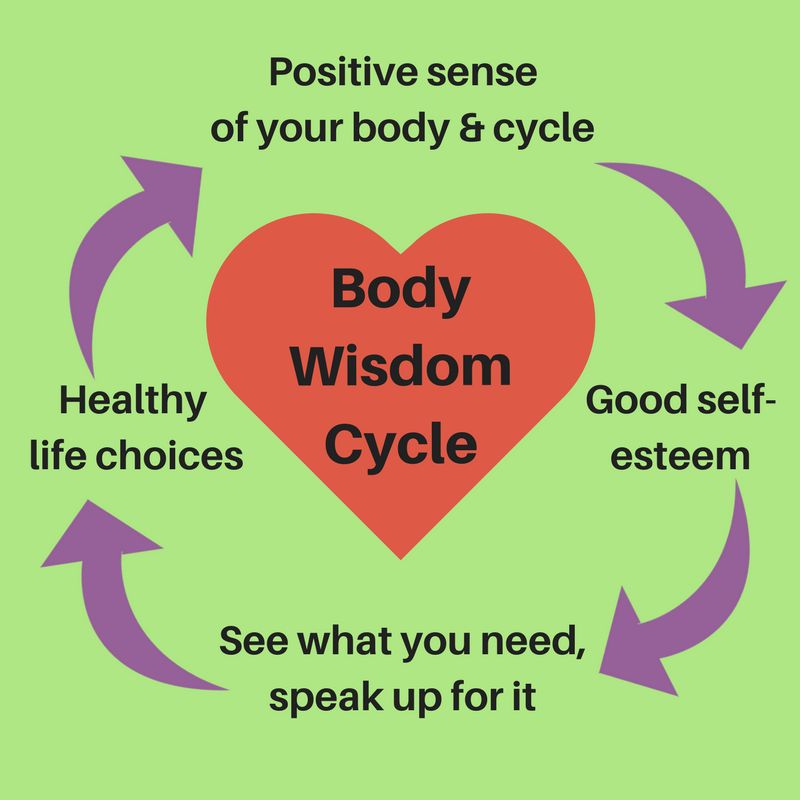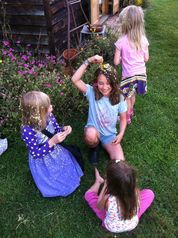 Your daughter's journey into womanhood is directly influenced by what she sees around her Your daughter's journey into womanhood is directly influenced by what she sees around her We cross the bridge into adulthood having watched how our parents treat and talk (or don’t talk) about their own bodies, relationships and needs, and this can go a long way to supporting our own positive sense of our body and self. Imagine you’re a baby getting your nappy changed. Your mum screws up her face and says ‘Stinky poo!’ You don’t understand the words yet but you hear the disapproving tone as she cleans up the ‘mess’ that you had enjoyed pushing out. Over time, you learn to hide your bodily pleasure. Imagine you’re a toddler, and your parents teach you to wash yourself ‘down there’ and never actually use the word vulva. Over time, you learn that talking about your sexual organs is not acceptable. Imagine you’re primary school age, and it’s normal for you to hear your mum complaining about her weight, wishing that her belly were smaller, comparing other people’s legs to hers and seeing her go on diets. Over time, you learn to compartmentalise and objectify your body. Imagine you’re a teenager, and your parents have only ever talked with you about sexuality once, when your body first started changing. They’ve never talked with you about the pleasures of intimacy with a partner. Over time, you learn that this is not something you learn about or discuss with your loved ones. Developing a healthy connection to your sexuality begins early in life and continues through your primary school years, even before puberty’s changes. Five-year-olds can learn about consent and internalise their rights and skills in giving a clear yes or clear no to how they are treated by others. I’ve heard that sexual predators prey on the less confident children. If a child doesn’t know the parts of their body or can’t speak up about their boundaries, it’s easier to keep them silent around something they sense is shameful. Criteria for emotional well-being … and sexual interest and satisfaction If a young person has low self-esteem, limited ability to self-soothe, poor coping skills and negative body image, they will struggle, according to Evelyn Resh, author of The Secret Lives of Teen Girls. We want our children to connect with themselves and their own needs, and enjoy intimate relationships. Resh’s criteria for this are: Reflection questions and/or strategies for parents from Secret Lives of Teen GirlsAround your own approach
Around conversation about bodies and sexuality Normalise sex and sexuality in conversations, both with your daughter and in your own life.
Around self-care She needs to see you live a life that includes sensual pleasure for you! How do you feel about your own body? Are you connected to your menstrual cycle and its associated changes in body, mood and energy?
Around rules Reflect on your experience as a teen and your parenting now. Are you repeating your mother’s style or have you adapted your rules to what’s appropriate for your daughter and these times?
Around Sexually Transmitted Infections (STIs)
The cost of hidden stress and why we need to speak up Let's be warriors AND magic-workers Let's be warriors AND magic-workers When the body says no: Exploring the stress-disease connection, Mate, Gabor, 2003, John Wiley & Sons, Inc, NJ. This book both shocked and inspired me. It may seem odd that I’m referencing a book called When the body says no: Exploring the stress-disease connection from my Daughters and Sexuality workshop, but I really believe we need to help our children to listen to their bodies, recognise what they need (and deserve to have), and then have the confidence to speak up for this, either in relationships or with health professionals. This book freaked me out a little, because it looks at all the ways that putting others before yourself, denying your own needs (and gut feeling, which can be ignored so often that you no longer recognise it), staying cheerful and repressing anger lead to long-term stress on your body, which can then emerge with scary effects on your auto-immune system. And parents beware: we learn these ‘skills’ from our family of origin. Maté’s seven As of healing - and how I believe they relate to your daughter's sexualityAcceptance The willingness to recognise and accept how things are, and the courage to permit negative thinking. Awareness We can learn to read symptoms not only as problems to be overcome but as messages to be heard. Anger Repression of anger is a major risk factor for disease, but anger differs from rage or hostility. Healthy anger is an empowerment, but repression and rage represent fear of the genuine experience of anger. Autonomy People suffer when their boundaries are blurred. Boundaries and autonomy are essential for health. Autonomy is the development of that internal centre of control. Attachment Connection is vital to healing. Behind our anger lies a deeply frustrated need for truly intimate contact. Healing both requires […] regaining the vulnerability that made us shut down emotionally in the first place. Assertion Assertion challenges the belief that we must somehow justify our existence. It is being, irrespective of action. Affirmation Health rests on 3 pillars: the body, the psyche and the spiritual connection. To ignore any one of them is to invite imbalance and dis-ease. Now, this is a mighty list of ideas, and I'm not saying that you're doomed if you're not perfectly well-adjusted. Believe me, I have to put my hand up for plenty of mistakes and bad habits in how I live and relate to others. All we can do is keep building our awareness and compassion, for ourselves as much as for those around us. But if you’re true to yourself, speaking up for what you like and don’t like, you’re much more likely to have friendships, relationships and sexual experiences that are mutually pleasurable, fun and nurturing for you. Which means that you can live sustainably and well, doing good and caring for our world. And I don't know about you, but that's all I'm after. World peace and a great life for everyone. References I mention in my Daughters and Sexuality workshopHere’s a list with some overview of what each reference is about. If you recall one that I mentioned that isn’t here, please ask me! I have a resource booklet that includes reviews, resources and quotes from them, which you can email me to purchase a copy for $15 plus postage. : )
TED Talks Listening to shame and The power of vulnerability by Brene Brown. Her work is powerful. If you haven’t seen these or read any of her books, please do! A Blessing not a Curse: A Mother daughter guide to the transition from girl to woman, Bennett, Jane A great guide, with stories, practical tips and great cultural stories, too. The Secret Lives of Teen Girls: What your Mother Wouldn't Talk About but your Daughter Needs to Know, Resh, Evelyn 2009, Hay House Inc, California, USA. This was the book that inspired me to first present this workshop on daughters and sexuality. I highly recommend it. Queen Bees and Wannabes Wiseman, Rosalind. Really readable, insightful and practical, including examples of what to say to your daughter in various tricky friendship situations, looking also at pressures of body image and expectations in teen relationships. Eye-opening and helpful. Things Girls Need from their Fathers An article from the Huffington Post, posted 06/18/2013. This is really great for all parents to read, and makes infinite sense. As soon as you have a baby is a great time to read this! Linked to a similar article for what is needed from mothers. Talk Soon. Talk Often. A guide for parents talking to their kids about sex. Free downloadable booklet from Government of Western Australia Departent of Health. A great guide for what is appropriate to say when, with examples. Nice layout with lovely pics, too! When can teenagers have a partner sleep over? Article by Maddy Silver, Sydney Morning Herald 17/3/14. Really great food for thought. Compares the Netherlands and the USA; in the former case, with parents more open and accepting of teen sexual relationships, there’s less teen pregnancy. Puberty Girl Movsessian, Shushann 2004 Allen and Unwin, Sydney. This is for mature pre-teens and teens – really friendly language that tells you the straight-up facts in a non-medical way. TED Talk: Your body language may shape who you are, Cuddy, Amy (who also researched and wrote the great book called Presence: Bringing your boldest self to your biggest challenges, 2016 Orion, London. Great research on power poses and how you can develop greater self-confidence.
1 Comment
|
Author
-Janoel Liddy is passionate about girls and women recognizing and acting on their needs to lead a satisfying life. She teaches puberty and wellbeing to girls and boys in schools, facilitates workshops and retreats and works with groups in TAFE, university and community organisations in training and events. She is a mother of two with her partner of over two decades and dances, cooks, reads and writes when she can and must. Categories
All
Archives
April 2018
|



 RSS Feed
RSS Feed